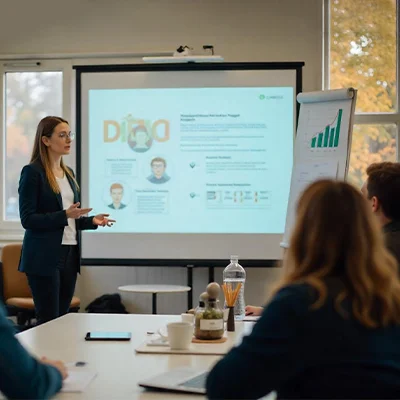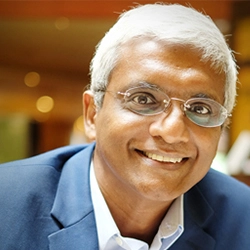Artificial intelligence is reshaping the business of banking faster than any previous technology wave. From credit assessment to compliance, from customer engagement to operational resilience, AI is redefining how financial institutions create value, manage risk and serve their clients. The next generation of banking leaders must not only understand these technologies but also learn how to integrate them into the core architecture of their institutions.
Yet, for many organisations, the journey towards becoming an AI-driven bank remains uncertain. Boards face difficult questions around data readiness, governance, and return on investment. Talent gaps, fragmented systems and regulatory ambiguity continue to slow adoption. At the same time, global competition is accelerating, with new players leveraging generative and agentic AI to build faster, leaner and more adaptive business models.
Building the AI Bank Bootcamp is a global executive learning series designed to equip decision-makers with the frameworks, tools and strategies to navigate this transformation. Each regional edition – in Asia, the Middle East and Africa – brings together leading bankers, regulators and innovators for an immersive, outcomes-driven experience focused on practical implementation. Through expert-led discussions, peer exchange and hands-on learning, participants will define what building an AI-enabled financial institution truly means in their regional and organisational context.
For Past Event Photos Click Here

Shape executive strategies for future banking

Lead technology-driven transformation

Strengthen decision-making and governance

Design customer-first product innovations

Manage data, ethics and trust

Drive organisational change

Expand peer networks across the region
Banking in an intelligent economy
Evolving technology architecture
Data governance and cybersecurity
Customer engagement and new products
Leadership and talent strategies
Fairness, ethics and trust
Regulatory models and public policy



The bootcamp sessions will comprise:
Chairmen and board members of traditional and digital banks
CEOs and senior management
Heads of strategic planning, innovation and business development
Heads of AI, data, analytics, cybersecurity, channels and distribution
Senior managers driving AI adoption across banking functions
Regulators and policymakers shaping AI governance in financial services
18:00 – 20:00
An opportunity for participants to meet fellow attendees, faculty and guest speakers. The session includes an introduction to the bootcamp, key themes to be explored and how to prepare for the discussions ahead.
07:00 – 08:30
08:30 – 10.00
This session examines how banks must anticipate changes in demographics, technology and economic structures and adapt for long-term relevance. It connects macro trends with banking strategy, helping leaders align their institution’s vision with the evolving marketplace.
Key Learning Points:
With discussion papers and structured dialogues
10:00 – 10:30
10:30 – 11:30
With rapid breakthroughs in generative AI, robotics and quantum computing, banks must develop clear strategic roadmaps to stay ahead. This session helps leaders identify priorities, sequence initiatives and allocate resources for both immediate wins and long-term transformation.
11:30 – 12:30
Agentic AI will transform how customers interact with banks and manage financial relationships. This session explores how banking apps and platforms must evolve to meet new expectations and examines the shifting role of embedded finance in everyday life.
12:30 – 14:00
14:00 – 15:30
AI is reshaping how bank technology is created and maintained, and how data is procured, stored and processed. Many IT vendors are still struggling to adapt. Banks need their own mental map of what to build, what to buy and how to manage vendor relationships. These are now CEO-level decisions that must return to the board before moving forward. This session helps leaders plan a clear architecture strategy for the future.
15:30 – 16:00
16:00 – 17:30
AI will transform every banking function, from advisory to claims processing to payments and fraud detection. Banks must rethink how to organise talent, structure teams and develop new capabilities. This session explores how development teams, business units and operations should work together to drive AI adoption across the organisation.
17:30
18:30
07:00 – 08:30
08:30 – 10.00
AI systems can amplify bias, compromise privacy, and damage trust if not properly governed. Banks must embed ethics and integrity into algorithms and organisational culture. This session uses real scenarios to explore how to build transparency, fairness, and accountability across AI-enabled services.
10:00 – 10:30
10:30 – 12:30
AI is creating new cybersecurity threats at unprecedented scale. At the same time, banks must navigate evolving regulations while building secure, trusted AI-driven services. This session examines how to manage these risks, engage with regulators and help shape future policy. Recommendations from this session will be published as a white paper for participants to share with their regulators.
12:30 – 14:00
14:00 – 15:30
AI is redefining what banks can offer to customers. From personalised mortgages to crypto and IoT-driven services, product innovation must keep pace with new technologies and evolving customer lifestyles. This session challenges participants to think beyond current offerings and explore what will create real value in the intelligent economy.
15:30 – 16:00
16:00 – 17:30
AI will reshape how banks measure performance, both financial and non-financial. This closing group exercise helps participants translate their learning into practical strategies and metrics. Teams will develop an AI transition roadmap for their organisation and critique each other’s approaches, to sharpen thinking and foster cross-learning.
Final Words
17:30
The programme is anchored and delivered by some of the most experienced professionals in the industry.




US$ 5,800
*Excludes airfare, visa fees, airport transfers and dinners
US$ 5,000
*Excludes airfare, visa fees, airport transfers and dinners